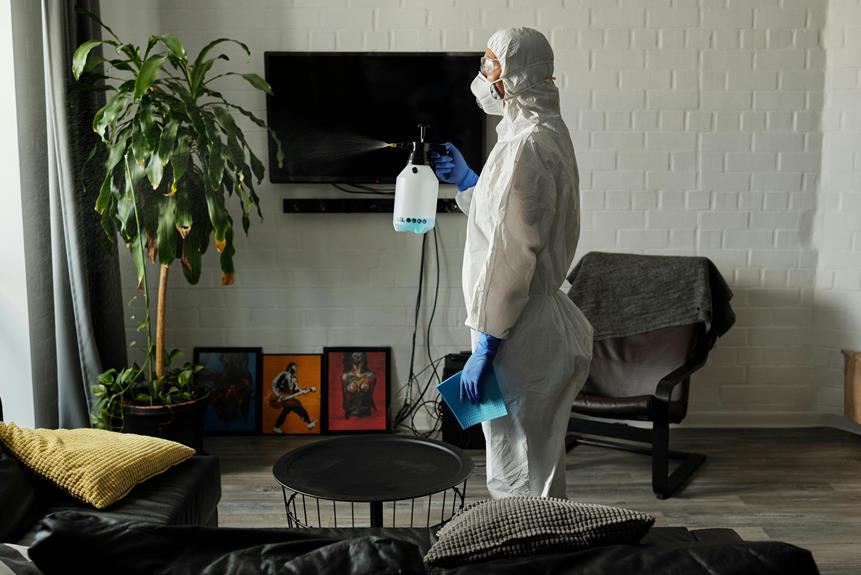Is your TV signal strength good but quality poor with freezing and pixelation. Poor TV signal quality often arises from interference, signal reflections, or cable issues.
Electrical interference, signal reflections from nearby objects, and aging cables can degrade signal integrity. Incorrect antenna orientation also leads to suboptimal reception.
Use signal meters to diagnose these issues accurately. Upgrading to high-quality coaxial cables, grounding your antenna system, and implementing signal filters can greatly improve quality.
Regular maintenance and adjustments are vital. For precise troubleshooting, consider professional assessments using advanced tools. You’ll discover more effective solutions and strategies.
Key Information
- Signal reflections and multipath interference can cause poor quality despite strong signal strength.
- Electrical interference from household devices may degrade signal quality.
- Compressed broadcast signals can reduce the overall quality received.
- Aging or damaged cables can negatively impact signal performance.
- Incorrect antenna orientation could result in suboptimal signal reception.
Causes of Poor Signal Quality
Understanding the causes of poor signal quality is crucial for diagnosing and resolving TV reception issues effectively. Signal reflections and multipath interference often disrupt the signal, leading to degraded quality.
Electrical interference from household appliances can also compromise signal integrity. When broadcasters compress signals, the overall quality might suffer, even if the strength remains good.
Additionally, inspect your cables; aging or damaged ones can greatly impact performance.
Finally, make sure your antenna is correctly oriented and aligned. Inadequate positioning can result in suboptimal signal reception.
Diagnosing Signal Issues
Diagnosing signal issues requires you to systematically evaluate potential sources of interference, signal reflections, and equipment integrity. Begin by using accurate signal testing tools like the Promax Ranger meter to measure both signal strength and quality.
Despite a strong signal strength reading, fluctuating quality often indicates problems like multipath interference or signal compression. Inspect for signal reflections caused by objects obstructing the signal path, leading to audio and video distortions. Additionally, electrical interference from nearby devices can degrade signal quality.
Assess the integrity of your equipment, ensuring all connections are secure and cables are in good condition. By methodically analyzing these factors, you’ll pinpoint the root causes of poor signal quality, preparing you to implement effective solutions.
Solutions for Improving Quality
To improve TV signal quality, start by using a variable attenuator to fine-tune the signal strength without compromising the overall signal percentage.
Upgrade to higher-quality coaxial cables to minimize interference and signal degradation.
Confirm your antenna system is properly grounded to greatly reduce electrical interference.
Implement signal filters to eliminate unwanted noise, thereby enhancing the overall quality of the TV signal.
Regular maintenance, such as adjusting the antenna alignment and replacing damaged cables, plays an important role in maintaining excellent signal quality.
Equipment and Tools Needed
When addressing TV signal quality issues, you’ll need specialized tools like signal meters and amplifiers to ensure precise measurements and effective improvements.
Signal meters provide accurate readings of both signal strength and quality, essential for diagnosing problems. Signal amplifiers can boost weak signals, ensuring better reception.
For best results, consider using masthead amplifiers, which are installed near the aerial to amplify the signal before any potential interference.
Accurate equipment is vital for measuring TV signal precisely and troubleshooting any quality issues. Remember, while signal strength is important, signal quality plays a more critical role in ensuring a reliable viewing experience.
Proper tools will help you effectively address and resolve signal quality problems.
Professional Help and Services
Engaging professional help can provide precise diagnostic assessments and tailored solutions for your TV signal quality issues. Professionals utilize advanced signal testers like the Promax Ranger meter to accurately measure both signal strength and quality. This guarantees a thorough analysis of your system’s performance.
Local service providers have the expertise and specialized equipment to identify and address any underlying problems affecting signal quality. By seeking assistance from experienced professionals, you’ll benefit from their in-depth knowledge and customized solutions. These experts can pinpoint issues that may not be evident to the untrained eye, making sure that your TV signal quality is optimized.
Don’t hesitate to engage professional services to resolve your signal problems effectively.
Frequently Asked Questions
Why Is My TV Signal Quality Low?
Your TV signal quality is low due to factors like signal reflections, interference, or poor cable quality. Upgrade to a digital antenna, use signal filters, and verify proper antenna alignment to enhance your TV’s reception.
How Do I Fix Poor Signal Quality?
To fix poor signal quality, start by checking for signal reflections, interference, and cable damage. Use high-gain antennas, signal amplifiers, and proper grounding. Guarantee regular maintenance, correct antenna alignment, and consider upgrading to higher-quality coaxial cables.
What Is More Important, Signal Strength or Quality?
Signal quality is more important than strength. High signal quality guarantees clear, stable TV reception. Even with 100% signal strength, poor quality can disrupt viewing. Focus on improving quality for the best viewing experience.
How to Increase TV Signal Quality?
To improve TV signal quality, adjust the antenna position, upgrade to higher-quality aerial cables, install signal filters, and guarantee proper antenna alignment. Regular maintenance and timely equipment replacement also greatly enhance signal clarity and performance.
Conclusion
To guarantee the best TV viewing experience, you need to address poor signal quality despite strong signal strength. Diagnose issues by checking for interference, cable integrity, and proper alignment.
Improve quality with signal boosters, high-quality cables, and precise antenna positioning. Equip yourself with tools like signal meters and spectrum analyzers.
If complications persist, consult professional services for expert evaluation and resolution. By taking these steps, you’ll enhance your TV’s performance and viewing experience.



